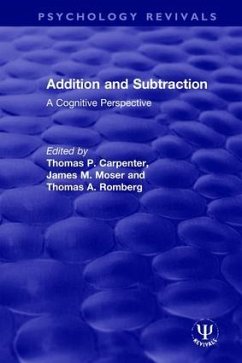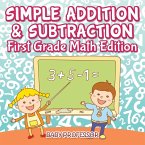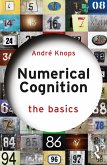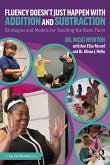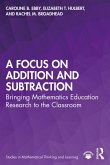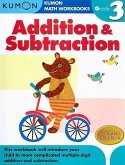Addition and Subtraction
A Cognitive Perspective
Herausgeber: Carpenter, Thomas P.; Romberg, Thomas A.; Moser, James M.
Addition and Subtraction
A Cognitive Perspective
Herausgeber: Carpenter, Thomas P.; Romberg, Thomas A.; Moser, James M.
- Broschiertes Buch
- Merkliste
- Auf die Merkliste
- Bewerten Bewerten
- Teilen
- Produkt teilen
- Produkterinnerung
- Produkterinnerung
First published in 1982, this work represents one of the first attempts to bring together the perspectives of a variety of different researchers investigating a specific, well defined content domain. It presents theoretical views and research findings investigating the early acquisition of addition and subtraction skills by young children.
Andere Kunden interessierten sich auch für
![Simple Addition & Subtraction First Grade Math Edition Simple Addition & Subtraction First Grade Math Edition]() Baby ProfessorSimple Addition & Subtraction First Grade Math Edition15,99 €
Baby ProfessorSimple Addition & Subtraction First Grade Math Edition15,99 €![Attention and Performance VI Attention and Performance VI]() Attention and Performance VI271,99 €
Attention and Performance VI271,99 €![Numerical Cognition Numerical Cognition]() Andre KnopsNumerical Cognition22,99 €
Andre KnopsNumerical Cognition22,99 €![Coaching Math Workshop Coaching Math Workshop]() Nicki Newton (USA Newton Educational Consulting)Coaching Math Workshop31,99 €
Nicki Newton (USA Newton Educational Consulting)Coaching Math Workshop31,99 €![Fluency Doesn't Just Happen with Addition and Subtraction Fluency Doesn't Just Happen with Addition and Subtraction]() Nicki Newton (USA Newton Educational Consulting)Fluency Doesn't Just Happen with Addition and Subtraction57,99 €
Nicki Newton (USA Newton Educational Consulting)Fluency Doesn't Just Happen with Addition and Subtraction57,99 €![A Focus on Addition and Subtraction A Focus on Addition and Subtraction]() Caroline Ebby (USA. University of Pennsylvania)A Focus on Addition and Subtraction48,99 €
Caroline Ebby (USA. University of Pennsylvania)A Focus on Addition and Subtraction48,99 €![Kumon Grade 3 Addition & Subtraction Kumon Grade 3 Addition & Subtraction]() Kumon Grade 3 Addition & Subtraction17,99 €
Kumon Grade 3 Addition & Subtraction17,99 €-
-
-
First published in 1982, this work represents one of the first attempts to bring together the perspectives of a variety of different researchers investigating a specific, well defined content domain. It presents theoretical views and research findings investigating the early acquisition of addition and subtraction skills by young children.
Produktdetails
- Produktdetails
- Psychology Revivals
- Verlag: Taylor & Francis Ltd
- Seitenzahl: 260
- Erscheinungstermin: 16. Februar 2022
- Englisch
- Abmessung: 234mm x 156mm x 14mm
- Gewicht: 410g
- ISBN-13: 9780367495589
- ISBN-10: 0367495589
- Artikelnr.: 62633791
- Herstellerkennzeichnung
- Libri GmbH
- Europaallee 1
- 36244 Bad Hersfeld
- gpsr@libri.de
- Psychology Revivals
- Verlag: Taylor & Francis Ltd
- Seitenzahl: 260
- Erscheinungstermin: 16. Februar 2022
- Englisch
- Abmessung: 234mm x 156mm x 14mm
- Gewicht: 410g
- ISBN-13: 9780367495589
- ISBN-10: 0367495589
- Artikelnr.: 62633791
- Herstellerkennzeichnung
- Libri GmbH
- Europaallee 1
- 36244 Bad Hersfeld
- gpsr@libri.de
Preface. 1. An Emerging Paradigm for Research on Addition and Subtraction
Skills Thomas A. Romberg 2. The Development of Addition and Subtraction
Problem-Solving Skills Thomas P. Carpenter and James M. Moser 3. Levels of
Description in the Analysis of Addition and Subtraction Word Problems
Pearla Nesher 4. A Classification of Cognitive Tasks and Operations of
Thought Involved in Addition and Subtraction Problems Gérard Vergnaud 5.
Interpretations of Number Operations and Symbolic Representations of
Addition and Subtraction J. Fred Weaver 6. An Analysis of the Counting-On
Solution Procedure in Addition Karen C. Fuson 7. Children's Counting in
Arithmetical Problem Solving Leslie P. Steffe, Patrick W. Thompson and John
Richards 8. The Development of Addition and Subtraction Abilities Prior to
Formal Schooling in Arithmetic Prentice Starkey and Rochel Gelman 9.
Towards a Generative Theory of "Bugs" John Seely Brown and Kurt VanLehn
10. Syntax and Semantics in Learning to Subtract Lauren B. Resnick 11.
General Developmental Influences on the Acquisition of Elementary Concepts
and Algorithms in Arithmetic Robbie Case 12. The Structure of Learned
Outcomes: A Refocusing for Mathematics Learning Kevin Collis 13. Type 1
Theories and Type 2 Theories in Relationship to Mathematical Learning
Richard R. Skemp 14. The Development of Addition in Contexts of Culture,
Social Class, and Race Herbert P. Ginsburg 15. Learning to Add and
Subtract: A Japanese Perspective Giyoo Hatano 16. The Psychological
Characteristics of the Formation of Elementary Mathematical Operations in
Children V. V. Davydov. Author Index. Subject Index.
Skills Thomas A. Romberg 2. The Development of Addition and Subtraction
Problem-Solving Skills Thomas P. Carpenter and James M. Moser 3. Levels of
Description in the Analysis of Addition and Subtraction Word Problems
Pearla Nesher 4. A Classification of Cognitive Tasks and Operations of
Thought Involved in Addition and Subtraction Problems Gérard Vergnaud 5.
Interpretations of Number Operations and Symbolic Representations of
Addition and Subtraction J. Fred Weaver 6. An Analysis of the Counting-On
Solution Procedure in Addition Karen C. Fuson 7. Children's Counting in
Arithmetical Problem Solving Leslie P. Steffe, Patrick W. Thompson and John
Richards 8. The Development of Addition and Subtraction Abilities Prior to
Formal Schooling in Arithmetic Prentice Starkey and Rochel Gelman 9.
Towards a Generative Theory of "Bugs" John Seely Brown and Kurt VanLehn
10. Syntax and Semantics in Learning to Subtract Lauren B. Resnick 11.
General Developmental Influences on the Acquisition of Elementary Concepts
and Algorithms in Arithmetic Robbie Case 12. The Structure of Learned
Outcomes: A Refocusing for Mathematics Learning Kevin Collis 13. Type 1
Theories and Type 2 Theories in Relationship to Mathematical Learning
Richard R. Skemp 14. The Development of Addition in Contexts of Culture,
Social Class, and Race Herbert P. Ginsburg 15. Learning to Add and
Subtract: A Japanese Perspective Giyoo Hatano 16. The Psychological
Characteristics of the Formation of Elementary Mathematical Operations in
Children V. V. Davydov. Author Index. Subject Index.
Preface. 1. An Emerging Paradigm for Research on Addition and Subtraction
Skills Thomas A. Romberg 2. The Development of Addition and Subtraction
Problem-Solving Skills Thomas P. Carpenter and James M. Moser 3. Levels of
Description in the Analysis of Addition and Subtraction Word Problems
Pearla Nesher 4. A Classification of Cognitive Tasks and Operations of
Thought Involved in Addition and Subtraction Problems Gérard Vergnaud 5.
Interpretations of Number Operations and Symbolic Representations of
Addition and Subtraction J. Fred Weaver 6. An Analysis of the Counting-On
Solution Procedure in Addition Karen C. Fuson 7. Children's Counting in
Arithmetical Problem Solving Leslie P. Steffe, Patrick W. Thompson and John
Richards 8. The Development of Addition and Subtraction Abilities Prior to
Formal Schooling in Arithmetic Prentice Starkey and Rochel Gelman 9.
Towards a Generative Theory of "Bugs" John Seely Brown and Kurt VanLehn
10. Syntax and Semantics in Learning to Subtract Lauren B. Resnick 11.
General Developmental Influences on the Acquisition of Elementary Concepts
and Algorithms in Arithmetic Robbie Case 12. The Structure of Learned
Outcomes: A Refocusing for Mathematics Learning Kevin Collis 13. Type 1
Theories and Type 2 Theories in Relationship to Mathematical Learning
Richard R. Skemp 14. The Development of Addition in Contexts of Culture,
Social Class, and Race Herbert P. Ginsburg 15. Learning to Add and
Subtract: A Japanese Perspective Giyoo Hatano 16. The Psychological
Characteristics of the Formation of Elementary Mathematical Operations in
Children V. V. Davydov. Author Index. Subject Index.
Skills Thomas A. Romberg 2. The Development of Addition and Subtraction
Problem-Solving Skills Thomas P. Carpenter and James M. Moser 3. Levels of
Description in the Analysis of Addition and Subtraction Word Problems
Pearla Nesher 4. A Classification of Cognitive Tasks and Operations of
Thought Involved in Addition and Subtraction Problems Gérard Vergnaud 5.
Interpretations of Number Operations and Symbolic Representations of
Addition and Subtraction J. Fred Weaver 6. An Analysis of the Counting-On
Solution Procedure in Addition Karen C. Fuson 7. Children's Counting in
Arithmetical Problem Solving Leslie P. Steffe, Patrick W. Thompson and John
Richards 8. The Development of Addition and Subtraction Abilities Prior to
Formal Schooling in Arithmetic Prentice Starkey and Rochel Gelman 9.
Towards a Generative Theory of "Bugs" John Seely Brown and Kurt VanLehn
10. Syntax and Semantics in Learning to Subtract Lauren B. Resnick 11.
General Developmental Influences on the Acquisition of Elementary Concepts
and Algorithms in Arithmetic Robbie Case 12. The Structure of Learned
Outcomes: A Refocusing for Mathematics Learning Kevin Collis 13. Type 1
Theories and Type 2 Theories in Relationship to Mathematical Learning
Richard R. Skemp 14. The Development of Addition in Contexts of Culture,
Social Class, and Race Herbert P. Ginsburg 15. Learning to Add and
Subtract: A Japanese Perspective Giyoo Hatano 16. The Psychological
Characteristics of the Formation of Elementary Mathematical Operations in
Children V. V. Davydov. Author Index. Subject Index.

